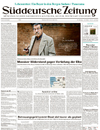It is a “cry” of dismay, argues Süddeutsche Zeitung, but it is one intended to provoke international controversy. The newspapers remarks have been prompted by a Günter Grass poem which has simultaneously been published by the Munich daily, The New York Times, La Repubblica et El Pais. In the poem entitled "What must be said", Grass warns against a war between Israel and Iran.
In view of the threat “of the extinction of the Iranian people”, the Nobel Prize laureate notably insists that Berlin should refuse to supply submarines to Tel-Aviv, arguing that Israeli nuclear capability is “a danger to the fragile peace in the world”. At the same time, the writer offers less detailed criticism of Iranian President Mahmoud Ahmadinejad, whom he simply describes as a “loudmouth”.
Grass, who shocked Europe with the 2006 revelations of his involvement in the Waffen SS, explains that fear of the “habitual verdict of anti-Semiticism” led him to remain silent for too long.
In Germany, controversy immediately followed the publication of the text, which featured on the front pages of three national dailies, including Die Welt, which headlined: “Günter Grass, the eternal anti-Semite”. The star columnist of the Berlin daily, polemicist Henryk M. Broder remarks —
Grass is the prototype of the educated anti-Semite, who is well-meaning when it comes to Jews. Haunted by feelings of guilt and shame and also driven by the desire to settle history, he is now attempting to disarm the 'cause of the recognizable threat.'
Do you like our work?
Help multilingual European journalism to thrive, without ads or paywalls. Your one-off or regular support will keep our newsroom independent. Thank you!
















